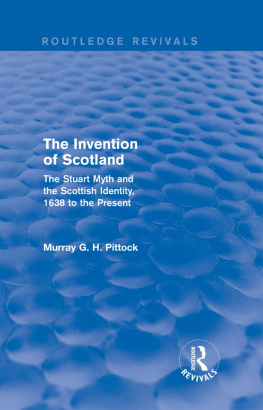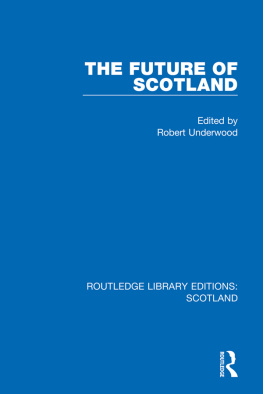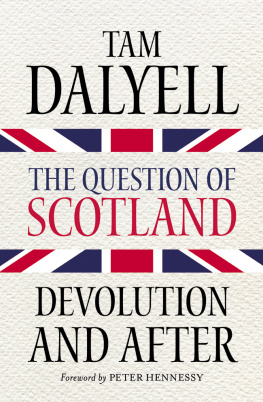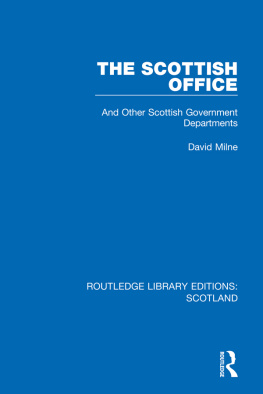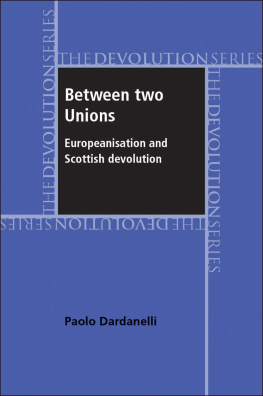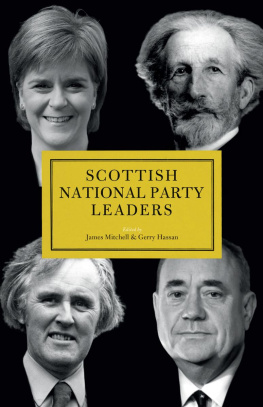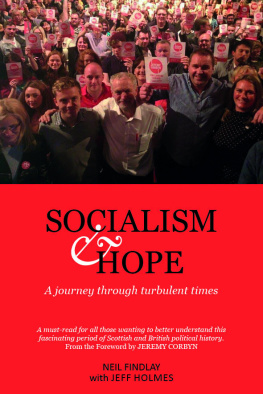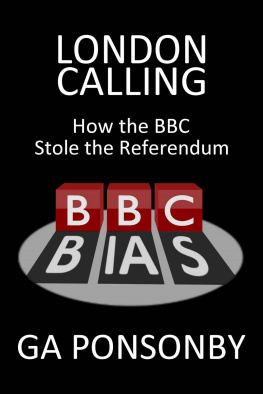Title Page
THE SCOTTISH POLITICAL SYSTEM SINCE DEVOLUTION
From New Politics to the New Scottish Government
Paul Cairney
Title Page Verso
Copyright Paul Cairney, 2011
The moral rights of the author have been asserted.
No part of this publication may be reproduced in any form without permission, except for the quotation of brief passages in criticism and discussion.
Originally published in the UK by
Imprint Academic, PO Box 200, Exeter EX5 5YX, UK
Originally published in the USA by
Imprint Academic, Philosophy Documentation Center
PO Box 7147, Charlottesville, VA 22906-7147, USA
Digital version converted and published in 2012 by
Andrews UK Limited
www.andrewsuk.com
Dedication
For my lovely partner Linda,
our beautiful children, Evie, Alfie and Frankie,
and our smelly but handsome dog
(who can be seen here: http://smallvillagebigdog.wordpress.com/ )
List of Abbreviations
AMS | Additional Member System |
ASBO | Anti-social Behaviour Order |
CAP | Common Agricultural Policy (EU) |
CCR | Collective cabinet responsibility |
CCT | Compulsory Competitive Tendering |
CFP | Common Fisheries Policy (EU) |
COSLA | Convention of Scottish Local Authorities |
CPD | Continuous Professional Development |
CSG | Consultative Steering Group |
DCA | Deparment for Constitutional Affairs |
ECHR | European Convention on Human Rights |
ECtHR | European Court of Human Rights |
EIS | Educational Institute for Scotland |
EU | European Union |
EYF | End Year Flexibility (Scottish Executive savings from assigned budget) |
FM | First Minister |
FOI | Freedom of information |
HMIe | Her Majestys Inspectorate of Education |
IGR | Intergovernmental relations |
JMC | Joint Ministerial Committee |
LCM | Legislative Consent (Sewel) Motion |
LSVT | Large scale voluntary transfer (council housing stocks) |
LTS | Learning and Teaching Scotland |
MLG | Multi-level governance |
MMP | Mixed Member Proportional (electoral system) |
MOU | Memorandum of Understanding |
MP | Member of Parliament (Westminster, UK) |
MPA | Ministerial Parliamentary Aide (later Parliamentary Liaison Officer) |
MSP | Member of the Scottish Parliament |
NCT | Negotiating Committee for Teachers |
NDPB | Non Departmental Public Body (quango) |
NEBU | Non-Executive Bills Unit |
NHS | National Health Service |
NICE | National Institute for health and Clinical Excellence |
PFI | Private Finance Initiative |
PPP | Public Private Partnerships |
PR | Proportional representation |
PSA | Public Service Agreement |
Quango (QNG) | Qua si-autonomous N on- G overnmental O rganisation |
SCC | Scottish Constitutional Convention |
SCF | Scottish Civic Forum |
SCVO | Scottish Council for Voluntary Organisations |
SEPA | Scottish Environmental Protection Agency |
SFT | Scottish Futures Trust |
SMC | Scottish Medicines Consortium |
SNCT | Scottish Negotiating Committee for Teachers |
SNP | Scottish National Party |
SOA | Single Outcome Agreement |
SPADs | Special advisers |
SPCB | Scottish Parliament Corporate Body |
SPICe | Scottish Parliament Information Centre |
SQA | Scottish Qualifications Authority |
SSP | Scottish Socialist Party |
STUC | Scottish Trades Union Congress |
STV | Single transferable vote (not Scottish Television) |
Preface
I wanted to start the book with something punchy about the importance of Scottish devolution. I settled on Devolution in 1999 was a major event in Scottish politics but, as a careful academic, instantly felt the need to qualify this statement to death - which would defeat the purpose. Instead, I decided to qualify it here. There are two standard qualifications. The first is that devolution is a process, not an event. This statement is generally attributed to former Welsh Secretary Ron Davies who used it to assure Welsh people that their initial devolution settlement would be improved as devolution became popular and its institutions and politicians more mature. However, it is also used by commentators in Scotland to counter the sense of a devolution settlement which will go no further. Devolution is going further even if independence doesnt happen.
Second, we play down the importance of that event in two main ways. We identify points of continuity in Scottish politics, suggesting that administrative devolution existed long before political devolution and that key institutions - relating to education, local government, the legal system and the church - are decades or centuries old. Indeed, Kellas (1989) famous argument is that a Scottish Political System existed before 1999. We also question the novelty of new politics, a rather vague term generally used to describe our hopes and dreams regarding devolution (Mitchell, 2000). But, still, devolution in 1999 was a major event in Scottish politics. We can say the same for the next sentence on the shift from a unitary to a quasi-federal state, and then my suggestion that we have a new political system. These are problematic statements but I dont want you to fall asleep before I get past my introductory paragraph. Just go with it if you know the unitary/union state/quasi-federal literature or the political system debate already, ignore it, or read up on it (I recommend McGarvey and Cairney, 2008) and come back to this book later.
This study of Scottish devolution draws heavily from the devolution monitoring programme led by Robert Hazell in the UCLs Constitution Unit. The Scottish Devolution Monitoring effort has been led by Graham Leicester, James Mitchell, Peter Jones, Akash Paun, Charlie Jeffery, Nicola McEwen, and Paul Cairney (also note the Constitution Units Devolution and Health reports, which ran from 1999-2001). There have been many contributors to the individual parts of the Scottish reports on which I draw: David Bell, Eberhard Bort, Julie Brown, Paul Cairney, Alex Christie, John Curtice, John Harris, Charlie Jeffery, Michael Keating, Peter Lynch, Lynne MacMillan, Nicola McEwen, Neil McGarvey, James Mitchell, Akash Paun, Kirsty Regan, Nicholas Rengger, Jane Saren, Philip Schlesinger, David Scott, Mark Shephard, Alan Trench, Barry Winetrobe, and Alex Wright. I would like to take this opportunity to thank them for their hard work. I have this nagging feeling that some contributors will think that I am just pinching their work and calling it my own, when in fact I am trying to get the most out of these reports. In particular, I would like to thank Neil McGarvey and Barry Winetrobe, who read most of the chapters and gave me some very useful comments. Further, Michael Clancy from the Law Society of Scotland reminded me of the importance of the ECHR to public policy in Scotland and John Curtice provided some figures to complete chapter 7. Final thanks to Anthony Freeman, Imprint Academic, for being so patient.
Next page


